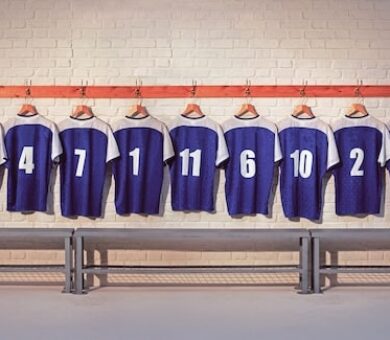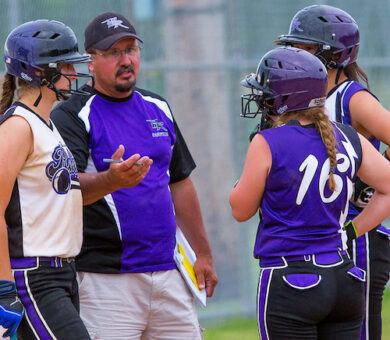How to Make a Positive Impact on Your Student Athletes
How can high school coaches make a difference in the lives of their student athletes?
High school coaches have a tough job. Most are not paid well and often have other full-time jobs. Many have families and children who also play sports. Some are teachers who work at the high school where they coach, while others teach or work elsewhere.
On top of that, many high school coaches have to follow out-of-season restrictions and, therefore, have very little time to work with their student athletes. They usually have about two weeks, if that, to prepare for their seasons and have maybe a week or two in the off-season to work with their student athletes.
Many high school coaches fall second to their athletes’ travel programs and coaches, who generally have more time to work with the athletes.
Because sports have become so prominent in the lives of so many, and particularly in many young people’s lives, all coaches have a role and a responsibility in the development of their athletes.
Coaches will be mentors, role models and guides for each life that passes through their tutelage whether they realize it or not. Some coaches will take this more seriously than others, but the responsibility remains when choosing to wear the “coaching hat.”
Here are tips from some high school coaches who made lasting impressions on their student athletes’ lives:

Be Present
This may be the most difficult tip as we are all very busy in today’s world. Have you ever experienced talking to someone when they are busy or half-listening but politely responding as if they were listening? This is what sometimes happens to high school students attempting to get the attention of busy coaches, parents, teachers and even friends.
It works in the other direction, too. Some student athletes hardly hear a word from those around them because they are distracted by their phones, social media, or they are not interested in the conversation.
Regardless of the reason, we have all been in conversations where one or both parties tune out. You can and should be present for your student athletes.
Some Ways to Show You Are Present
- Put the phones down.
- Make eye contact.
- Tune out everything else from the day.
- Don’t allow distractions to interrupt the conversation.
- Restate the questions or answers.
- Be clear in your responses.
Work on following these tips, making them habits. Be aware of how you behave in conversations.

Follow Up
Follow up on any items that need your feedback or commitments you have made to the student athlete. Have you ever had someone ask you to do something and then completely forget to do it? Remember what was said in conversations and follow up with what you said you would do.
Some Tips to Remember to Follow Up
- Carry a small notepad to write things down.
- Jot down things in the notepad on your cell phone.
- Use a voice recorder to take your notes for the important things to remember.
- Send yourself text messages.
- Ask the other person to send you a reminder text or email.
- Make a note and keep a daily list in the calendar on your phone.
This list is not exhaustive. There are so many apps and tools to help you follow up on things. You will find other ways to jog your memory.
Reach Out
Many high school student-athletes do not expect their coaches to reach out and offer help. By reaching out before being asked, you demonstrate genuine interest in the student athlete.
By simply asking if you can help, you might find that the student athlete really wants your help. Many high-school-aged teens are struggling with COVID impresssions, not having constant contact with friends, not having sports, family issues, money problems and many other things. There may also be concerned about their futures.
Many student athletes probably do need someone to encourage and assure them that things will be okay.
Ideas for Reaching Out
- Send a pick-me-up text to the team or to an individual.
- Have a virtual team gathering.
- Ask about school and how they are doing in classes.
- Ask about what they are interested in studying in college.
- Ask about their family members.
- Set goals with them for grades, sports or anything else they wish to accomplish.
- Ask how they are doing with the recruiting process and if they need help with anything.
- Call them out of the blue to say hello and to “just check in.”
- Offer to do extra workouts with them.

Push and Challenge Them
Your student athletes want to get better, and they want structure. Some high school coaches will be easy on their athletes to let them succeed. Others will push too hard, and the student athletes will feel like failures. The tricky part is finding the right balance, a balance that will be different for each athlete.
Some Different Ways to Challenge Your Athletes
- Divide them into teams to do a community service challenge.
- Organize a community clean up.
- Challenge the athletes to call a grandparent or someone else who is special to them.
- Create a fun challenge for other teams at the high school or in the same conference.
- Set goals with your players and let them lead the conversation.
- Push them hard in practice and then pick them up afterward.
- Challenge them to take a step forward with their recruiting process, like making a call to a coach or sending a game video.
- Challenge them to reach a standard in the next game.
There are so many ways to challenge both individuals and full teams.
Maintain an Open Door Policy
When athletes know you are always accessible, they will visit more often. It lets them know you are open to listening. It’s also a way to build relationships.
You and the student athletes will have stronger relationships if you welcome them into your office and spend time with them beyond the regular practices and competitions.
This, of course, includes having conversations that are not about sports or how they played yesterday but just about how they are doing in general. An open-door policy means you care and that you are ready when they need you.
It may be a little more difficult if you don’t work at the high school, so you may have to get more creative with how you present an open-door policy.
Ways to Show Your Door Is Open
- Come a little earlier to practice or stay a little later.
- Arrange weekend practices where you have more time to spend with the students.
- Give your athletes “office hours” to visit or call in.
- Set up weekly meetings with captains or other categories of groups on your team.
- Communicate to them that your door is always open.
You have a big responsibility as a coach. Seeing them succeed in high school and in college is both a goal and a reward.


